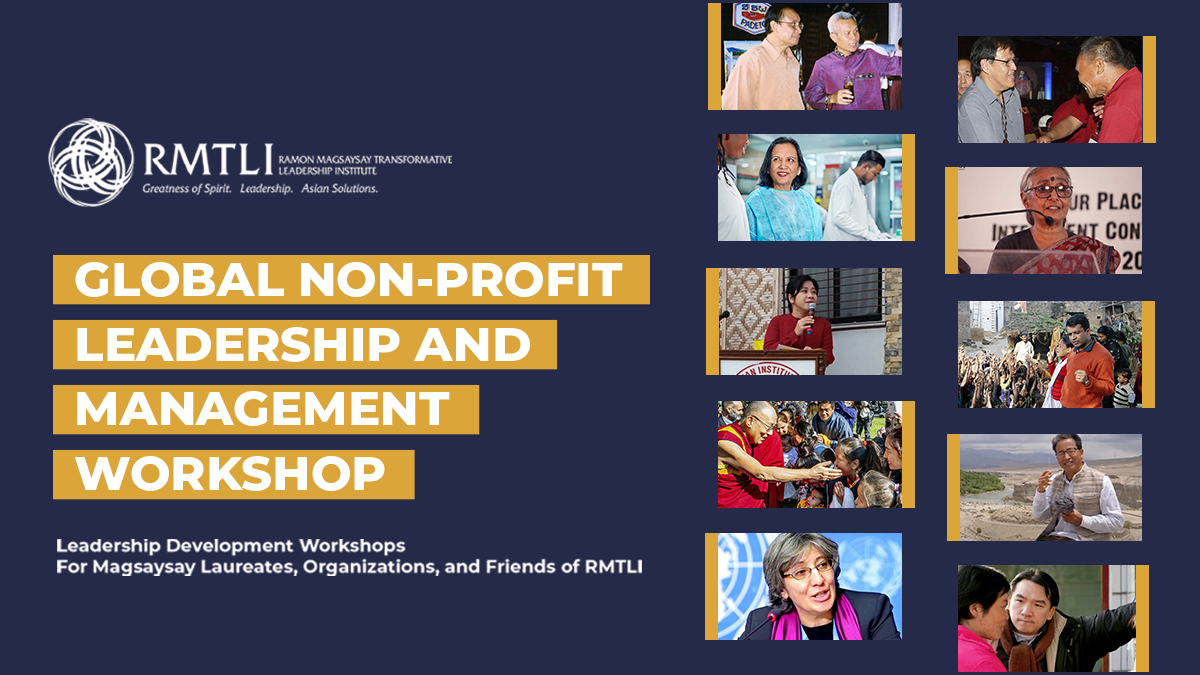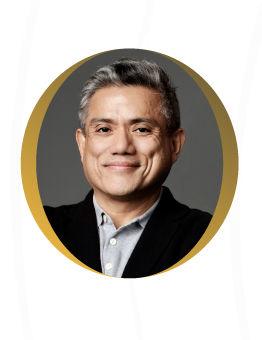Join us in our 65th Anniversary
GET INVOLVED

In continuing the Ramon Magsaysay Award Foundation’s (RMAF) mission of celebrating Greatness of Spirit and transformative leadership in Asia, the Foundation, through the Ramon Magsaysay Transformative Leadership Institute (RMTLI) launched its newest program, Global Non-Profit Leadership and Management. This is a series of workshops that brings together Ramon Magsaysay Awardees, development leaders from Asia, and lecturers from across the world to share their expertise in development work. The first installment of the year-long program commenced last October 2021 through the help of lecturers from Columbia University and Johns Hopkins.
We talked with one of the co-convenors of the program, Prof. Erwin de Leon of Columbia University, and discussed the importance of cross-collaboration, the needs of nonprofits and why we need to collectively shift to a more data-driven culture.
RMAF: Given how busy you are, why did you choose to partner with RMAF in mounting the capacity-building workshops for Ramon Magsaysay Awardees and non-government organizations?
Prof. Erwin: I’ve always wanted to return to my roots in Asia and to give back by sharing what I have learned since emigrating to the U.S. over thirty years ago. My collaboration with RMAF is an extension of my personal relationship with Susan Afan, RMAF’s president. She was my high school religion teacher at Ateneo and we had reconnected via LinkedIn. When I learned about RMAF’s amazing work and inspiring laureates, I had to find the time. It is an opportunity to reconnect and to be of service.
RMAF: How does it feel to mentor the Ramon Magsaysay laureates in the first workshop? Are you in any way intimidated that social development leaders in Asia are listening to you?
Prof. Erwin: Humbled more than anything else. These are individuals who do the hard work and inspire others to follow their lead. It does say a lot about them that they are open to learning a thing or two that might be useful in furthering their missions. That is true leadership. At the end of the day, it’s about the people and communities they serve, not about them. If there’s a chance they can pick some good ideas and practices from us, then it’s worth their time zooming in. It’s definitely been worth my time!
RMAF: Is it surprising to you that the renowned leaders in their respective development sectors need to know more about funding, capacity building and service delivery particular to their institutions?
Prof. Erwin: No, not at all. As leaders, they know what they don’t know and they seek answers. And nobody knows everything. No one.
It’s also structural, the charitable sectors in the US, UK, and other rich countries have long been professionalized. Thus a Master’s in Nonprofit Management at Columbia University! Graduate and certificate programs in nonprofit management and fundraising have proliferated in this part of the world for decades. I got my Master’s in Nonprofit Management 20 years ago.
The professionalization of the charitable sector in the Philippines and Asia was one of the first topics that Susan and I discussed. Frankly, it was what reeled me in. We agree that although so much good work has been done by NGOs throughout Asia, Asian practitioners might gain some insight and best practices from those of us who are U.S. nonprofit professionals and educators.
RMAF: When we hear data analytics and metrics, it sounds Greek to most of us, complex and difficult to understand. How do you convey to a layman or someone not so into these data, its relevance to his institution? And how to navigate the data gathered or culled from their own website, day-to-day operations and other forms of research?
Prof. Erwin: It need not be. Think of it this way: as individuals and organizations, we make decisions every day based on information available to us. If “information” sounds less daunting than “data analytics and metrics”, then let’s stick with “information”. What I teach and advocate is for organizations to make informed decisions, that is, decisions based on solid data and metrics. The goal is to use information—data and metrics—in making decisions that result in effective and efficient programs and services. It’s about using data/information to meet your mission.
As for the how, that’s where courses and workshops come in. I spent an entire semester teaching data analytics and metrics for nonprofits!
RMAF: In the first workshop, RMTLI did a quick survey. One of the questions asked is “What challenges are you experiencing in running your organization?” And the highest percentage in the answer is data analytics and management (69.8%). Given this data, what is your take on it? Is this a common thread in the social development sector?
Prof. Erwin: It certainly is, globally. Most nonprofits and other mission-driven organizations are way behind corporations that have learned to harness data and technology to their advantage. Of course, size does matter. Larger nonprofits such as educational and medical institutions have the resources and capacities as companies of comparable size. A vast majority of NGOs don’t have the wherewithal to optimize data and technology.
Foundations, philanthropists, and governments that count on nonprofits to serve communities need to build the capacity of their grantees. They need to pay for the technology and training required to make nonprofits more data-savvy.
RMAF: How do we develop a data-driven culture? Are there simple steps to follow? Or is it a case-to-case basis per organization?
Prof. Erwin: Developing a data-driven culture won’t be easy and simple, but it is feasible and will pay off.
First and foremost, there must be a commitment to fostering a data-driven culture from the top and buy-in among the ranks. If your executive director and board members don’t believe in the value of shifting culture and in investing in technology and training, you will not succeed. If your staff members see all this as more work on top of their teetering pile, you will fail.
Here are a few things to keep in mind when attempting to shift your organization’s culture to a more data-driven one. Start by acknowledging and respecting the current culture. Some policies, procedures, and practices may very well be worth keeping. Explain how data culture aligns with strategy and goals. Take baby, incremental steps. Be clear about outputs (short-term) and outcomes (long-term). Most of all, be honest with data and never lose sight of your mission.
 |
Prof. Erwin de Leon is the Chief Diversity Officer of Columbia University’s School of Professional Studies and a Lecturer in the Nonprofit Management Program. His areas of expertise include data analytics and metrics and organizational management and ethics. He is also a Research Fellow at Knology and a member of the Empire State Bioethics Consortium. He has served in various organizations, including the Urban Institute, and others. |
|---|